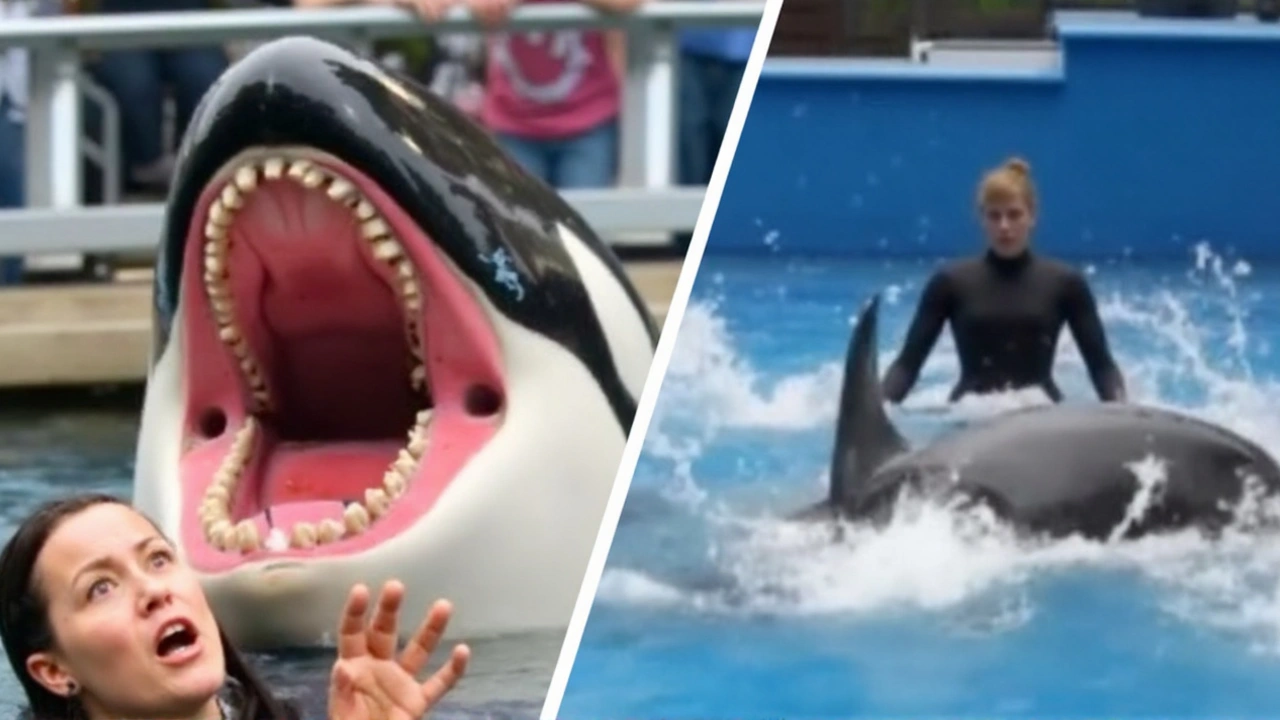The Viral Orca Trainer Video That Never Happened
If you spent any time on TikTok or Facebook lately, you probably saw a gut-wrenching video claiming a young marine trainer named Jessica Radcliffe was killed by an orca during a live show. The video went viral in record time. It showed what looked like panicked chaos, lifeguards freaking out, and people screaming as the narrator described a fatal attack at Pacific Blue Marine Park. According to that narration, Jessica died within minutes, supposedly after her menstrual blood triggered an orca’s aggression—an odd, disturbing detail that made the story even more sensational.
Viewers responded with horror, and comment sections filled up with “RIP Jessica” and people alleging marine parks are covering up animal violence. On the surface, there were just enough realistic details to make it all sound plausible, especially considering real orca-related tragedies in the past. But after this story exploded online, fact-checkers rolled up their sleeves—and the real plot twist came out: none of it happened. Jessica Radcliffe isn’t just alive; there’s no public record she ever existed at all in the world of marine animals.
How a Hoax Fooled the Internet and Why It Felt So Real
Let’s get into how well this hoax was crafted. The video made use of old orca training footage combined with AI-generated voices and narration. Experts looking at the clip said the voices weren’t from any real newscaster or marine park staff—they were made with artificial intelligence. Some shots were lifted from public domain archives, then remixed with convincing, but totally fake, storytelling.
Digging deeper, journalists and marine park officials searched every obvious place: marine park employee lists, occupational safety databases, obituaries, news archives, even the Occupational Safety and Health Administration logs. Not a single mention of Jessica Radcliffe popped up anywhere. No reports, no statements, nothing.
So where did this story really come from? The hoax wove together real details from two tragic deaths involving trainers and killer whales. In 2009, Alexis Martinez died after an attack by an orca at Spain’s Loro Park. The following year, Dawn Brancheau lost her life in front of a stunned audience at SeaWorld Orlando. Her story was widely covered, made famous in the documentary ‘Blackfish,’ and left a deep mark on public conversations about orca safety and captivity. The creators of the fake Jessica Radcliffe video clearly borrowed bits from these stories—enough so that the video felt familiar and horrifyingly real, despite being made up from whole cloth.
Even more disturbing, as the Jessica Radcliffe story picked up steam, another eerily similar video started to trend. This time the victim was called Marina Lysaro, also supposedly attacked by an orca during a public performance. When media checked those facts, they found the same thing: total fabrication, no evidence, and plenty of AI-generated trickery.
Social media sites have started reacting—flagging the clips, removing posts, and putting warnings on videos. But you can’t unsee something once it’s made the rounds. People who thought they watched a real tragedy have been left unsettled and angry at being misled.
The viral hoax did open up real conversations about the risks trainers face around orcas, but it also showed just how easily AI tech can cook up fake news that looks and sounds authentic. With technology evolving fast, telling what’s real from what’s fake online keeps getting tougher. For now, the Jessica Radcliffe video sits as a weird reminder: before you hit 'share,' it’s worth checking if the story actually happened—or if someone, or something, just wants you to believe it did.







Comments
naresh g
This is terrifying. AI didn’t just make a fake video-it made a fake *person*. Jessica Radcliffe? No record. No birth certificate. No LinkedIn. No Instagram. No press release from any marine park. And yet, millions believed it. The emotional manipulation is chilling. Who’s funding this? Who’s testing how far we’ll fall for synthetic grief?
And the menstrual blood detail? That wasn’t random. That’s a trope from old, sexist marine park panic narratives. Someone knew exactly what buttons to push.
Brajesh Yadav
I'm literally shaking rn 😭💔 This is worse than any horror movie. Someone out there is literally manufacturing tragedies to make us cry for clicks. And now we’re all traumatized by a ghost. RIP Jessica… who doesn’t exist. The world is broken. 🤯💔 #WakeUpPeople
Govind Gupta
It’s fascinating how the hoax piggybacked on real trauma-Dawn Brancheau’s death, Blackfish, the public’s lingering guilt about orca captivity. The creators didn’t invent fear; they just repackaged it with a new name and a synthetic voice. That’s not just AI-it’s psychological engineering. We’ve outsourced our empathy to algorithms, and now they’re monetizing our grief.
tushar singh
Hey everyone-just wanna say it’s okay to feel shaken by this. We all want to believe in truth, and when that gets twisted, it hurts. But the fact that fact-checkers jumped in? That’s hope. Keep questioning. Keep sharing verified info. We’re better than this.
Nikhil nilkhan
It’s funny how we’ll cry over a fake person but ignore real suffering happening right now. The orcas in captivity? Still there. The trainers still risking their lives? Still there. The system hasn’t changed. We just got distracted by a digital ghost while the real monsters stayed quiet.
Damini Nichinnamettlu
This is why India needs stricter digital literacy laws. We’re not just being fooled-we’re being weaponized. Someone used our emotional vulnerability to spread chaos. This isn’t just misinformation. It’s cyber-terrorism disguised as viral content. And we’re the ones paying the price in mental health.
Vinod Pillai
AI is the new weapon. No more need for propaganda sheets. Just feed data into a model and spit out a fake tragedy. It’s cheaper than hiring actors. And we’re all too dumb to notice. Wake up. This isn’t science fiction. It’s Tuesday.
Avantika Dandapani
I watched that video. I cried. I shared it. I felt so guilty for not knowing the truth sooner. But I’m not mad at myself-I’m mad at the people who made it. They knew someone would feel this. They counted on it. And now I’m scared of my own heart. How do I trust anything again?
Ayushi Dongre
The ontological instability of digital media has reached a critical inflection point. The ontogeny of synthetic identity-constructed through algorithmic synthesis of affective cues, historical trauma narratives, and emotional archetypes-has rendered the epistemic authority of the visual medium obsolete. We are no longer consumers of information; we are subjects of affective manipulation engineered by non-human agents operating beyond the regulatory frameworks of human morality.
rakesh meena
Check before you share. That’s it. That’s the whole thing.
sandeep singh
Western media loves this stuff. Fake tragedy, fake victim, fake outrage. All to distract from real problems. This isn’t AI-it’s a psyop. And the people who believed it? They’re the ones who voted for the system that lets this happen.
Sumit Garg
You think this is just some random troll? Think again. The timing, the specificity, the emotional triggers-all too perfect. This was coordinated. The same actors behind the 'Pizzagate' deepfakes, the 'Covid lab leak' fabrications, the 'Biden phone' scams-they’ve moved on to synthetic human tragedy. And the next one? It won’t be about orcas. It’ll be about your child.
Sneha N
I’m so saddened by this… 🌊💔 It feels like the world is losing its soul. We used to mourn real people. Now we mourn ghosts made of code. I don’t know how to feel anymore…
Manjunath Nayak BP
Okay, so here’s the real tea: this isn’t the first time AI has been used to fabricate human suffering. Back in 2021, there was that fake video of a child being kidnapped in Texas-got 200M views, police wasted 72 hours chasing it. Then there was the AI-generated ‘dead soldier’ from Ukraine that went viral in Russia. And now this? This is just phase one. The next phase? AI-generated testimonials from ‘victims’ of fake wars, fake diseases, fake famines-all designed to trigger donations, votes, or panic. And guess what? The same algorithms that made Jessica Radcliffe are now training on your Instagram likes to predict how to break you next. You’re not just being lied to-you’re being modeled. And they know exactly how much grief your soul can hold before you click ‘share’ again.
Tulika Singh
We create stories to make sense of chaos. But when the stories are made by machines, we lose the thread. Maybe the real tragedy isn’t the hoax. It’s that we stopped asking why we wanted to believe it.